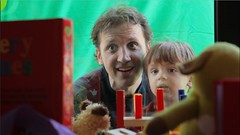Mark Nickelsburg, a longtime East Village resident, will debut “Harry Grows Up” tonight at the inaugural New York International Short Film Festival at Sunshine Cinema. The 12-minute film is about a toddler, Harry (played by Mr. Nickelsburg’s son Lucas) who loses his babysitter (Elizabeth Elkins) when she heads off to college. The tot sinks into the kind of deep depression that results in empty baby bottles strewn about the house, leading narrator Josh Hamilton to quip, “I’m not the first heartbroken New Yorker to turn to the bottle.” But then along comes Zoey, a love interest closer to Harry’s age. Mr. Nickelsburg, 41, described the short as a “romantic comedy for adults, starring babies.” The Local spoke with him about filming his own son in the streets of the East Village.
One of the major characters in your film is the East Village. Was that intentional?
Yes. The experiences that Harry is going through and some of the locations that he’s going to I drew from my own experiences. Like the storefront that figures prominently in the movie, that was around the corner from where I used to live. Moonstruck is the diner on Fifth and Second where Harry drowns his sorrows. I went there all the time.
Did you ever have a breakdown in Moonstruck diner like Harry did?
[Laughs] Yeah, that’s why I picked the diner. But it’s not specific to breakups. The diner was open 24-hours, so if I was having a bad day, rather than sit and sulk in the apartment, I’d go down to the diner and get a beer.
Did you go into this project thinking the film would be a romance?
No. My wife Sari and I were talking about what I should do next and about Lucas, and my wife was like, “Why don’t you make the film with him? Maybe his babysitter leaves him.” So we just started shooting stuff on the weekends. One of the earliest shots was, I put the camera on the fire escape, and Lucas and Sari walked down the sidewalk. Afterwards I painted her out, and I thought it’ll be so funny and cute, this little kid walking down the street. One by one I started taking other people out of the frame. He looked so small and vulnerable, and I went, “Oh, a film like this would be something.”
How much of your own story is in this?
It’s my own story and I think it’s a lot of people’s story. That’s what attracted me to it because it’s universal. When you’re young, we have crushes and we think that’s all we need, and if I could just have that person, everything would be great. But in reality you don’t know anything about that person, you don’t know if you’re compatible in the least, you just have this crush.
How did you have to adjust your filmmaking techniques when working with babies?
It was a huge adjustment. They’re toddlers, they’re between the ages of one and two, so you can’t give direction; you have to do what’s called substitutions. If you want them to look happy, or look here or there, you have to put a cartoon of Elmo on your iPhone and move it over there and he’ll look in the direction you want him to look. If I wanted him to run, you can’t just say “run,” you have to go, “Chase mommy!”
Why is the film in black and white?
We’re sort of setting up this world where from the get-go, the audience has to accept that it’s a real world where a toddler is just walking around. Doing something stylistic like that sets it up right away. Also, black and white is romantic. And then it’s also a New York story. Classic New York stories just feel right in black and white.
Cindy Chupack, former executive producer and writer of “Sex and the City,” worked on the film’s screenplay with you. What is your relationship with Cindy like?
We each had a film in Palm Springs International Shortsfest opening night. We met there and really hit it off. Cindy’s awesome. She has incredible talent and at the same time, wears her humanity on her sleeve. So we kept in touch and when this became a romantic comedy, I called her up and asked her what she thought of this, and she made some suggestions. When I finished the rough cut, I sent it to her, and said, “I’ll admit, writing dialogue is not my thing.” So she said, “I love the film, let me help you out with that.” We collaborated back and forth with that. A lot of those key, funny lines are hers. She added something I could have never added.
And how did Josh Hamilton get picked up as the narrator?
I know him through a casting agent. Josh just brought something that really elevated the film. Josh could speak with this childlike wonder. He just knew what I was going for, and just had the talent and the skill to pull it off. It was such an essential; if that voice didn’t work, the film just didn’t work.




